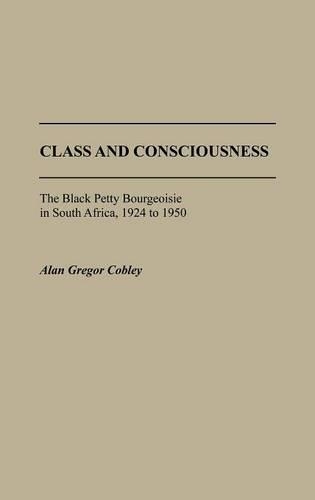
Class and Consciousness: The Black Petty Bourgeoisie in South Africa, 1924 to 1950
(Hardback)
Publishing Details
Class and Consciousness: The Black Petty Bourgeoisie in South Africa, 1924 to 1950
By (Author) Alan G. Cobley
Bloomsbury Publishing PLC
Praeger Publishers Inc
21st May 1990
United States
Classifications
Tertiary Education
Non Fiction
Ethnic studies / Ethnicity
968.05
Physical Properties
Hardback
272
Description
This book discusses the emergence and nature of the black bourgeoisie in South Africa in its historical context as a class "in itself and for itself". It reveals how, by the 1920s, the black petty bourgeoisie was emerging in South Africa through the process of capitalist development, out of pre-existing elites and out of new elites based mainly in the new industrial centres. The book then discusses how the black petty bourgeoise deployed, in the 1930s, a wide range of class-specific social and cultural networks (using forms borrowed from the dominant classes) as a means of entrenching and reproducing its class position. The book details the significant differentiation within the black petty bourgeoisie - revealing it to be divided into a more economically secure upper stratum and a much larger lower stratum which was always vulnerable to proletarianization. The book also shows that members of the petty black bourgeoisie virtually monopolized political leadership in black communities up to 1950 and beyond. This had very important consequences for the formulation and articulation of black political objectives at both the local and national levels and especially for the developing African nationalist movement. Chapters 1 and 2 investigate the economic background, social origins and cultural consciousness of the black petty bourgeoisie. Chapters 3, 4 and 5 consider the influence of special cultural factors, entrepreneurial ideologies and experiences, and radical ideologies and experiences. An overview is contained in a brief conclusion.
Author Bio
ALAN GREGOR COBLEY is a Lecturer in African History at the University of West Indies, Bridgetown, Barbados. His academic interests are in South African History, with special reference to twentieth-century black social and cultural history.
